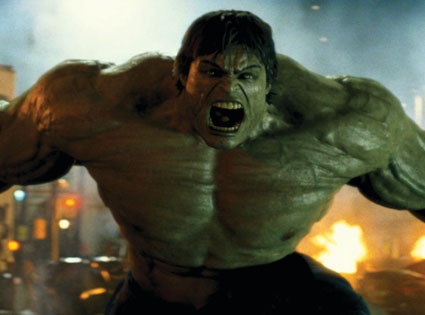 Universal Pictures
Universal PicturesMeet the new Hulk, same as the old Hulk.
Good reviews, solid buzz and all, The Incredible Hulk is virtually tied with the box-office performance of 2003's Hulk, bad reviews, worse buzz and all.
Through Sunday, at the end of its fourth weekend, The Incredible Hulk's domestic take stood at $124.8 million. At the same point in its run, Hulk had grossed $124.7 million.
What's going on? Why hasn't the new and improved movie put more distance between itself and the old movie?
Time to review the suspects:
It's Hulk's fault.
Well, actually, no, say the comic-book experts, it's not.
"He's always been one of the Marvel premiere characters," says Herve St-Louis, publisher of the Web's Comic Book Bin.
In comics, he's been a player since 1962. On TV, he enjoyed a successful run via his 1978-82 prime-time series. And yet as a box-office draw, he's emerged as a "midrange" franchise, as Box Office Mojo's Brandon Gray puts it, more Daredevil than Spider-Man.
Graphic artist Scott Saavedra, who blogs about comics at his site, Comic Book Heaven, wonders if the Hulk's supporting cast—best girl Betty Ross, adversary Gen. "Thunderbolt" Ross, etc.—isn't as compelling to movie audiences as Spider-Man's or Batman's crew. The TV series, for one, steered clear of Hulk's comic family.
"It was more like The Fugitive," Saavedra says. "It wasn't about the Hulk battling supervillains. And, really, he [the Hulk monster] didn't turn up that much."
When he did turn up, he appeared as the painted-green Lou Ferrigno, not as a CGI creation, as he did in both Hulk movies.
"It's probably easier [for some people] to relate to the human character," St-Louis says.
But was that enough of a factor to keep the new Hulk movie from breaking wider? Or were bigger forces at play?
It's Ang Lee's fault.
The Oscar-winning Brokeback Mountain director helmed 2003's Hulk, or, as it's usually called, 2003's much-maligned Hulk.
The movie, dinged for being too ponderous, was further dinged for falling too far, too fast—scoring $62.1 million in its opening weekend, dropping 70 percent in its second weekend and never recovering.
Sums up Gray: "It was very much despised by the audience."
Still, one of the most interesting stats from The Incredible Hulk's opening weekend was that 82 percent of its ticket buyers had seen Lee's Hulk, which begs the question, if the first one was so terrible, why did so many repeat customers turn out for the second one?
Hard-core comic fans are not so easily dissuaded, Saavedra reminds.
Civilians, on the other hand, might have been confused.
"For nongeek people, [the new movie] wasn't branded as Hulk 2," St-Louis says. "Maybe they just didn't understand why there was a new movie."
But is a mixed marketing message really Lee's fault? And is Lee's fault really Lee's fault anyway?
It's Spider-Man's fault.
Lee's Hulk arrived in theaters the summer after Spider-Man set new standards for comic-book movies, with a $115 million opening weekend.
"Expectations," Gray says, "were through the roof."
When Hulk "only" debuted with $62.1 million, then the second biggest comic-book opening for a nonsequel, and then the biggest June opener ever, the movie was viewed as falling short.
But what if: Spider-Man-fueled expectations hadn't been so huge? Hulk had been allowed to be Fantastic Four (a $56 million opening; a $155 million overall take)? A franchise reboot had been made unnecessary?
What really happened, Gray argues, isn't all that bad.
It's time to move on.
"For them to come back five years after the disaster of the first Hulk and sell almost as many tickets is pretty good," Gray says.
Outside of opening weekend, when it came up with $55.4 million, The Incredible Hulk has outgrossed Hulk in each successive weekend—meaning it's playing better, playing longer.
Lee's Hulk, which cost a reported $137 million to make, staggered across the finish line at $132 million. Gray thinks The Incredible Hulk, with a reputed price tag of $150 million, has another $10-$15 million in it, which would put it at $135-$140 million domestically.
"At the end of the day, budget aside," Gray says, "The Incredible Hulk did a lot better than one might reasonably expect considering the vitriol surrounding the first movie."
St-Louis hopes the new movie, which he liked, will be discovered by a wider audience on DVD—and that the Hulk himself will be given one more big-screen chance.
"I probably wouldn't make Incredible Hulk 2 now," he says. "I probably would wait for The Avengers, then I would play each character off each other."
The Hulk can use all the superfriends he can get.